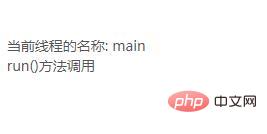Difference between Thread.start() and Thread.run() in Java
In Java's multi-threading concept, start() and run() are the two most important methods. So what's the difference between them? The following article will introduce you to the start() and run() methods and introduce the differences between them. I hope it will be helpful to you.

The start() method in Java
The start() method of the thread class can be used Start a thread; this method internally calls the run() method of the Runnable interface to execute the code specified in the run() method in a separate thread. [Video tutorial recommendation: Java tutorial]
The start() method starts the thread to perform the following tasks:
● It counts a new thread
● The thread moves from New State to Runnable state.
● When a thread has a chance to execute, its target run() method will run.
The run() method in Java
The run() method of the thread class is an abstract method of the Runnable interface, controlled by the java virtual machine If called directly, no new thread will be created.
The difference between start() method and run() method
1. Definition of method
# The ##start() method is defined in the java.lang.Thread class; and the run() method is defined in the java.lang.Runnable interface and must be rewritten in the implementation class.2. New thread creation
When the program calls the start() method, a new thread will be created and then the run() method will be executed. But if we call the run() method directly, no new thread will be created, the run() method will be executed as a regular method call of the current calling thread itself, and no multi-threading will occur. Example:class MyThread extends Thread {
public void run()
{
System.out.println("\n");
System.out.println("当前线程的名称: "
+ Thread.currentThread().getName());
System.out.println("run()方法调用");
}
}
class demo {
public static void main(String[] args)
{
MyThread t = new MyThread();
t.start();
}
}
class MyThread extends Thread {
public void run()
{
System.out.println("\n");
System.out.println("当前线程的名称: "
+ Thread.currentThread().getName());
System.out.println("run()方法调用");
}
}
class GeeksforGeeks {
public static void main(String[] args)
{
MyThread t = new MyThread();
t.run();
}
}
3. Multiple calls
The start() method cannot be called multiple times, otherwise a java.lang.IllegalStateException will be thrown; however, the run() method can be called multiple times. call because it's just a normal method call. The above is the entire content of this article, I hope it will be helpful to everyone's study. For more exciting content, you can pay attention to the relevant tutorial columns of the PHP Chinese website! ! !The above is the detailed content of Difference between Thread.start() and Thread.run() in Java. For more information, please follow other related articles on the PHP Chinese website!

Hot AI Tools

Undresser.AI Undress
AI-powered app for creating realistic nude photos

AI Clothes Remover
Online AI tool for removing clothes from photos.

Undress AI Tool
Undress images for free

Clothoff.io
AI clothes remover

AI Hentai Generator
Generate AI Hentai for free.

Hot Article

Hot Tools

Notepad++7.3.1
Easy-to-use and free code editor

SublimeText3 Chinese version
Chinese version, very easy to use

Zend Studio 13.0.1
Powerful PHP integrated development environment

Dreamweaver CS6
Visual web development tools

SublimeText3 Mac version
God-level code editing software (SublimeText3)

Hot Topics
 1378
1378
 52
52
 Perfect Number in Java
Aug 30, 2024 pm 04:28 PM
Perfect Number in Java
Aug 30, 2024 pm 04:28 PM
Guide to Perfect Number in Java. Here we discuss the Definition, How to check Perfect number in Java?, examples with code implementation.
 Random Number Generator in Java
Aug 30, 2024 pm 04:27 PM
Random Number Generator in Java
Aug 30, 2024 pm 04:27 PM
Guide to Random Number Generator in Java. Here we discuss Functions in Java with examples and two different Generators with ther examples.
 Weka in Java
Aug 30, 2024 pm 04:28 PM
Weka in Java
Aug 30, 2024 pm 04:28 PM
Guide to Weka in Java. Here we discuss the Introduction, how to use weka java, the type of platform, and advantages with examples.
 Smith Number in Java
Aug 30, 2024 pm 04:28 PM
Smith Number in Java
Aug 30, 2024 pm 04:28 PM
Guide to Smith Number in Java. Here we discuss the Definition, How to check smith number in Java? example with code implementation.
 Java Spring Interview Questions
Aug 30, 2024 pm 04:29 PM
Java Spring Interview Questions
Aug 30, 2024 pm 04:29 PM
In this article, we have kept the most asked Java Spring Interview Questions with their detailed answers. So that you can crack the interview.
 Break or return from Java 8 stream forEach?
Feb 07, 2025 pm 12:09 PM
Break or return from Java 8 stream forEach?
Feb 07, 2025 pm 12:09 PM
Java 8 introduces the Stream API, providing a powerful and expressive way to process data collections. However, a common question when using Stream is: How to break or return from a forEach operation? Traditional loops allow for early interruption or return, but Stream's forEach method does not directly support this method. This article will explain the reasons and explore alternative methods for implementing premature termination in Stream processing systems. Further reading: Java Stream API improvements Understand Stream forEach The forEach method is a terminal operation that performs one operation on each element in the Stream. Its design intention is
 TimeStamp to Date in Java
Aug 30, 2024 pm 04:28 PM
TimeStamp to Date in Java
Aug 30, 2024 pm 04:28 PM
Guide to TimeStamp to Date in Java. Here we also discuss the introduction and how to convert timestamp to date in java along with examples.
 Java Program to Find the Volume of Capsule
Feb 07, 2025 am 11:37 AM
Java Program to Find the Volume of Capsule
Feb 07, 2025 am 11:37 AM
Capsules are three-dimensional geometric figures, composed of a cylinder and a hemisphere at both ends. The volume of the capsule can be calculated by adding the volume of the cylinder and the volume of the hemisphere at both ends. This tutorial will discuss how to calculate the volume of a given capsule in Java using different methods. Capsule volume formula The formula for capsule volume is as follows: Capsule volume = Cylindrical volume Volume Two hemisphere volume in, r: The radius of the hemisphere. h: The height of the cylinder (excluding the hemisphere). Example 1 enter Radius = 5 units Height = 10 units Output Volume = 1570.8 cubic units explain Calculate volume using formula: Volume = π × r2 × h (4




